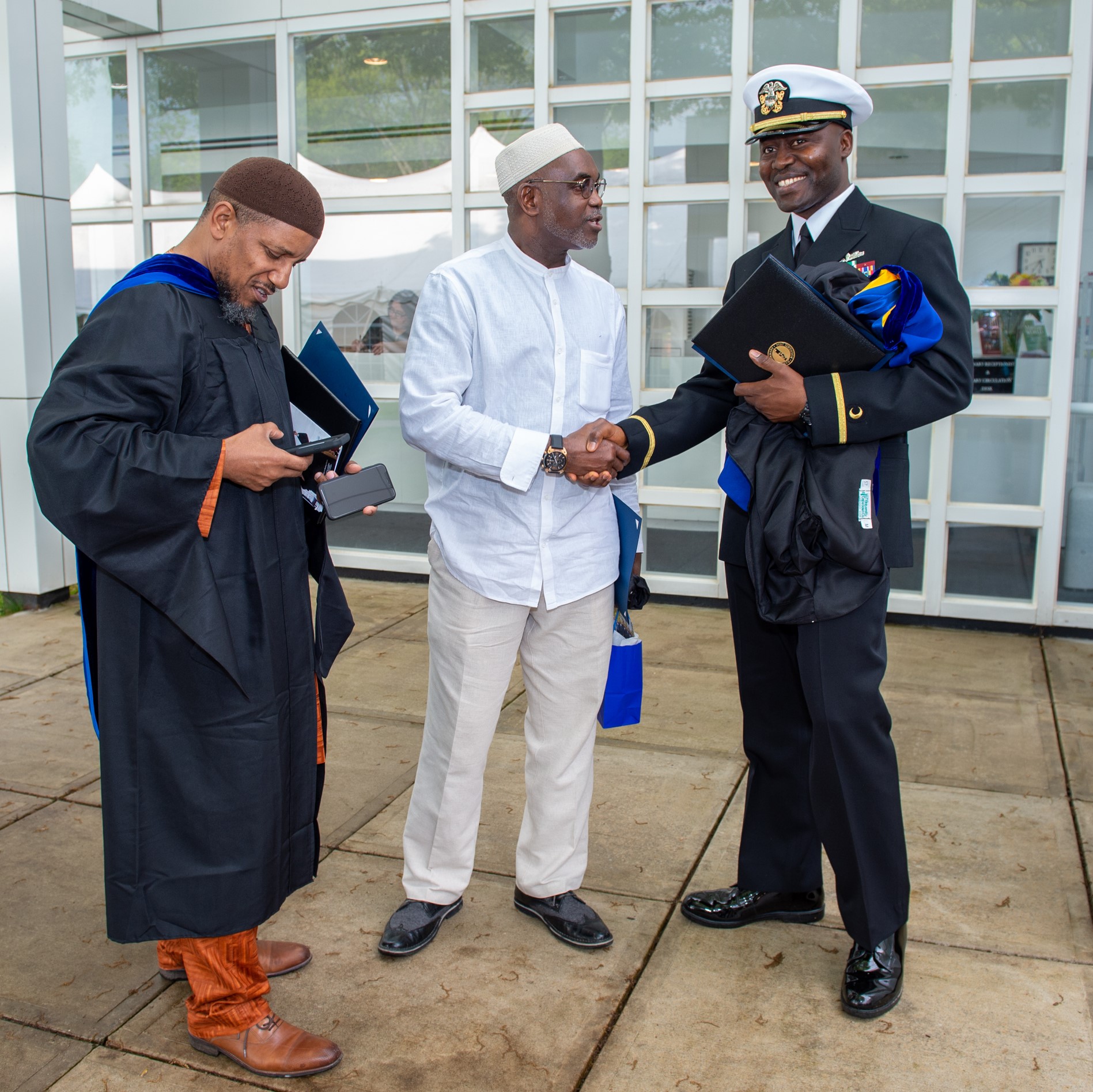 Dr. Bilal Ansari |
 Aida Mansoor |
About
Admissions
Program Components
Learning Outcomes
Financial Assistance
Since 2001, Hartford Seminary’s renowned Islamic Chaplaincy Program has produced professionals who are now leaders in the field of chaplaincy. These chaplains serve in diverse settings in federal prisons, armed services, in private and public hospitals, and higher education.
Twenty years on, the Islamic Chaplaincy Program has once again developed an innovative pathway to the profession of Chaplaincy for Muslim students. The new Islamic Chaplaincy curriculum has based its learning outcomes on the Association of Professional Chaplains’ Common Qualifications and Competencies for Professional Chaplains. The core requirements integrate theories with practices of chaplaincy rooted in the Islamic tradition. The goal is to produce chaplains who demonstrate the following abilities and qualities:
- Are self-reflective in their professional identity and conduct.
- Apply institutional and organizational knowledge in their professional practice as religious leaders.
The new Islamic Chaplaincy Program builds on the current strengths of Hartford Seminary, which include:
- the strong academic curriculum developed by excellent scholar-practitioner faculty;
- the interfaith orientation, work, and scholarship of the Duncan Black Macdonald Center for the Study of Islam and Christian-Muslim Relations; and
- the expertise of the Hartford Institute for Religion Research in working with active faith communities.
Pathways to Islamic Chaplaincy:
There are two pathways to professional positions in Islamic chaplaincy. The choice of the right degree program depends on the academic, Islamic, and professional training and experience with which a student enters the Seminary.
- Applicants who wish to gain both mastery over relevant academic fields and the skills and aptitudes of professional chaplaincy should apply to the 36-credit hour academic Master of Arts in Interreligious Studies (MAIRS) with a specialization in Islamic Studies. Upon completion of this degree, students will continue on to the professional Master of Arts in Chaplaincy (MAC), with a specialization in Islamic Chaplaincy. This pathway is a 72-credit program that combines academic study and practical training. The two degrees may not be done concurrently.
- Applicants with prerequisite knowledge and significant professional practice of chaplaincy who interview successfully with the director of the MAC program and are approved by the Admissions Committee may elect to matriculate directly into the Master of Arts in Chaplaincy (MAC).
| 36-credit M.A. in Interreligious Studies | 6 credits- Two Core Interreligious Seminars. 21 credits: Foundational Fields, Beliefs and Practices, Religious Pluralism. 3 credits- Elective. 3 credits- Final project. Language Proficiency in Qur’anic Arabic |
| 36-credit M.A. in Chaplaincy | 12 credits- Four Core Chaplaincy courses. 15 credits: Muslim Pastoral Theology, and four other Electives. 6 credits- Field Education. 3 credits- Clinical Pastoral Education. |
Faculty Mentoring
In consultation with the Co-Directors of the Islamic Chaplaincy Program, each student’s program will be customized to meet their particular educational needs and professional/vocational objectives within the formal guidelines and criteria established for the Islamic Chaplaincy Program at Hartford Seminary. Depending on the applicant’s previous education, experience, and the applicant’s future goals and intended career path, the applicant may be required to complete both degrees of the Islamic Chaplaincy Program. For further information, contact the Admissions Office at admissions@hartsem.edu.
Hartford Seminary is a partner of the Chaplaincy Innovation Lab.

Please see the Master of Arts in Chaplaincy Degree Program with specialization in Islamic Chaplaincy for complete information.
Please also see the Master of Arts in Interreligious Studies with specialization in Islamic Studies for complete information.

Students who have completed the Islamic Chaplaincy program will:
- Have achieved mastery of the competencies listed in Sections I-IV of the “Common Qualifications and Competencies for Professional Chaplains,” the evidence for this being recorded on Hartford Seminary’s “Competencies Progress-Tracking Worksheet” keyed to the BCCI list.
2.Have demonstrated knowledge of the Association of Professional Chaplains’ fifteen “Standards of Practice for Professional Chaplains.”
3.Have command of the Association of Professional Chaplains Code of Ethics, the evidence for this being recorded on Hartford Seminary’s “Code of Ethics Worksheet.”
4.Have acquired basic skills in Qur’anic recitation to function successfully as a Muslim Chaplain.

For information about financial assistance available through Hartford Seminary see the Financial Aid section of the website. In addition to the general options listed there, there are two financial assistance programs available through the seminary only for Islamic Chaplaincy students.
Islamic Chaplaincy Fund: Islamic chaplaincy students who qualify for Hartford Seminary need-based aid as of the Fall semester in any academic year may also be eligible for a small, supplemental award. Contact the director of the Islamic chaplaincy program for further information.
FADEL Education Foundation and Hartford Seminary Prison Chaplaincy Scholarship. As the scholarship’s name states, only students who will pursue careers in Correctional chaplaincy are eligible for this program. Contact the director of the Islamic chaplaincy program for further information.
Gainful Employment Disclosure: Graduate Certificate in Islamic Chaplaincy
 Sign-up now ›
Sign-up now ›